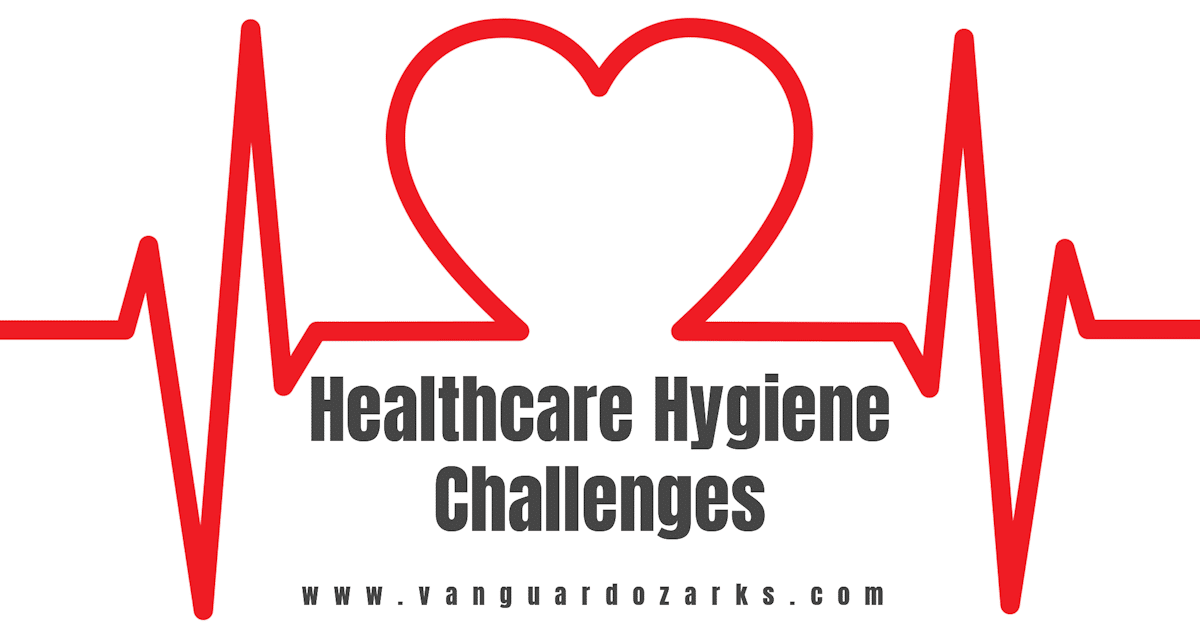The healthcare industry faces facility hygiene challenges, including preventing healthcare-associated infections (HAIs), maintaining clean environments, and controlling airborne pathogens, which can be addressed through evidence-based methods such as environmental cleaning and disinfection while outsourcing facility cleaning services can benefit healthcare facilities by providing specialized expertise, improving efficiency, and reducing infection risk.

Primary Facility Hygiene Challenges Facing the Healthcare Industry
The healthcare industry faces several facility hygiene challenges due to the critical nature of its work and the high risk of transmitting infections to vulnerable patients, including:
- Preventing Healthcare-Associated Infections (HAIs) - HAIs are infections that patients acquire while receiving medical treatment in a healthcare facility. Preventing HAIs is a significant challenge, as pathogens easily transmit through contaminated surfaces, medical equipment, and contact with infected patients or healthcare workers.
- Maintaining Clean and Sanitized Environments - Healthcare facilities must maintain a high level of cleanliness to prevent infection. This involves ensuring that all surfaces, equipment, and facilities are regularly cleaned and sanitized and that infection control protocols are strictly adhered to.
- Controlling Airborne Pathogens - Airborne pathogens are a significant risk in healthcare facilities, especially in areas where patients with respiratory illnesses are treated. Effective air filtration systems, ventilation, and air exchange can help reduce the spread of airborne pathogens.
- Managing Medical Waste - Healthcare facilities produce large quantities of medical waste that must be disposed of safely and effectively to prevent the spread of infection. This includes contaminated materials such as used needles, surgical instruments, and medical equipment.
- Ensuring Staff Compliance with Hygiene Protocols - Healthcare workers must adhere to strict hygiene protocols to prevent the spread of infection. This includes hand hygiene, wearing personal protective equipment (PPE), and following infection control policies and procedures. Ensuring staff compliance with these protocols is crucial to maintaining a safe and hygienic environment for patients and staff alike.
Evidence-based Methods for Addressing Healthcare Facility Hygiene Challenges
There are several evidence-based methods for addressing the facility hygiene challenges faced by the healthcare industry, including:
- Hand Hygiene - Hand hygiene is one of the most effective ways to prevent the spread of infection in healthcare settings. Evidence-based guidelines recommend using alcohol-based hand rubs, soap, and water for hand hygiene.
- Environmental Cleaning and Disinfection - Effective environmental cleaning and disinfection can reduce the risk of HAIs. Recommended guidelines include using EPA-registered disinfectants and following standardized cleaning protocols.
- Antimicrobial Stewardship - Antimicrobial stewardship involves using antibiotics appropriately to reduce the risk of antibiotic resistance and prevent HAIs. Standard practices involve implementing antimicrobial stewardship programs that include education, monitoring, and feedback.
- Personal Protective Equipment (PPE) - PPE such as gloves, gowns, and masks can reduce the risk of infection transmission from patients to healthcare workers and vice versa. Guidelines include using appropriate PPE based on the patient's infection status and the healthcare activity being performed.
- Vaccination - Vaccination can reduce the risk of healthcare-associated infections and protect patients and healthcare workers. Studies show routine vaccination of healthcare workers against influenza, measles, mumps, rubella, varicella, and hepatitis B.
- Engineering Controls - Engineering controls such as air filtration, ventilation, and barrier protections can reduce the risk of airborne infections in healthcare facilities. The recommendation is to implement these controls in areas where infectious patients are treated.
Proven Ways Outsourcing Facility Cleaning Services Can Benefit the Healthcare Industry
Outsourcing facility cleaning services can benefit the healthcare industry in several ways, including:
- Specialized Expertise - Professional cleaning service providers may have specialized expertise in cleaning healthcare facilities, including knowledge of infection control protocols, the use of EPA-registered disinfectants, and the proper handling and disposal of medical waste.
- Improved Efficiency - Outsourcing facility cleaning services can improve the efficiency of cleaning processes and reduce the burden on healthcare staff. Professional cleaning service providers can develop cleaning schedules, maintain cleaning equipment and supplies, and ensure that cleaning tasks are completed to a high standard.
- Reduced Risk of Infection - Professional cleaning service providers can reduce the risk of healthcare-associated infections by using evidence-based cleaning and disinfection protocols and ensuring that all surfaces and equipment are properly sanitized.
- Flexibility - Outsourcing facility cleaning services can provide healthcare facilities with more flexibility to adjust their cleaning needs based on changing patient volumes and infection control needs.
- Cost Savings - Outsourcing facility cleaning services may provide cost savings for healthcare facilities compared to hiring and training their own cleaning staff. Professional cleaning service providers can also help healthcare facilities reduce cleaning equipment and supplies costs.
Takeaway
Maintaining a clean and hygienic environment is crucial for the healthcare industry to ensure the safety and well-being of patients and staff.
This requires a comprehensive approach that involves adhering to strict hygiene protocols, implementing evidence-based cleaning and disinfection methods, and disposing of medical waste safely and effectively.
Outsourcing facility cleaning services can be a viable option for healthcare facilities to optimize their cleaning processes, reduce infection risk, and increase cost-effectiveness.
However, regardless of the approach taken, healthcare facilities must prioritize their facility hygiene practices to provide a safe and sanitary environment for patients to receive care.
Vanguard Cleaning Systems of the Ozarks' franchise-owned custodial service provider business cleans more than 8M sq. ft. weekly, maintaining an industry topping 95+% of its customer base, year-over-year, and boasting more than 60 5-star Google reviews.
Need more capability from your vendor partners? --Let's talk.
In Oklahoma, dial 918-960-4450
In Arkansas, dial 479-717-2410
In Missouri, dial 417-812-9777
